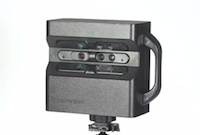Matterport 3D camera creates interactive models in minutes
posted Wednesday, April 2, 2014 at 12:12 PM EST

Another day, another example of how computational imaging is growing by leaps and bounds. Over at Wired, they’re showing off the work of a new 3D modeling camera by Matterport, which can create a complete, accurate, interactive model of any room in about 20 minutes. Set the boxy camera on a tripod on in the center of a room, watch it rotate, check the results on an iPad, and repeat a few times until the model is complete.
The camera uses a mix of 2D and 3D sensors to capture light and depth information. Through an iPad app, the data gets sent to Matterport’s servers which converts the 3D data, "into a very efficient format, called a polygonal mesh, that minimizes the storage size of the models and makes it easy to distribute through simple apps,” as the company describes it. It’s reminiscent of the way that Lytro does things—a variation on the same model, in a sense.
Realtors, architects, and insurance claims adjusters could get a lot of use out of something like this, creating interactive models for clients—and at $4,500 for the camera plus a monthly subscription somewhere between $50 and $150, it’s certainly priced for semi-industrial uses like those.
Google’s Project Tango is working toward a similar product, though housed in a device the size of a smartphone rather than a Rolleiflex twin-lens reflex camera-like device. And hey, wouldn’t you know, Matterport is one of the firms that's already worked on software for Tango. As they put it in a blog post, "We believe that the future of 3D scanning is mobile. As 3D sensors start showing up in phones and tablets, Matterport’s software will be an app enabling millions of people to capture, share, and interact with the world around them in 3D."
For more on the Matterport camera, check out the company’s website as well as the article at Wired. Then start thinking of ways that you’d use something like this, because it’s probably coming to your phone within the decade.
(Via Wired)